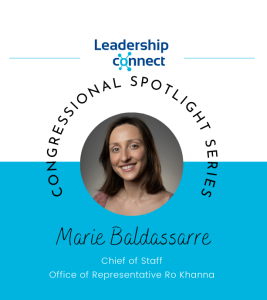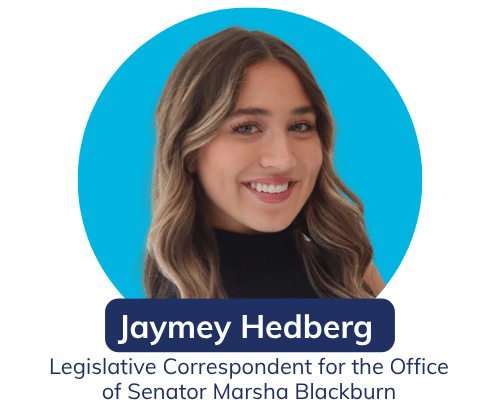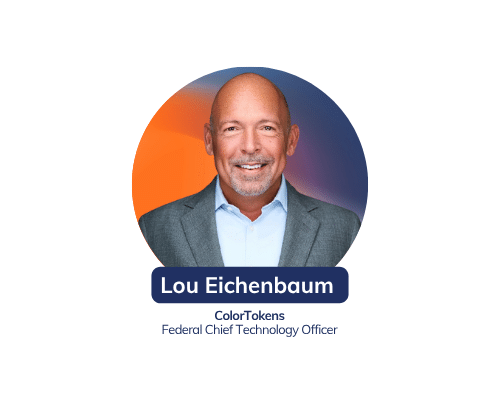Behind the Title: A Chief of Staff’s Path to Purpose and Progress
 This week, we spoke to Marie Baldassarre, Chief of Staff for the Office of Representative Ro Khanna.
This week, we spoke to Marie Baldassarre, Chief of Staff for the Office of Representative Ro Khanna.
Can you walk us through your career path and the steps that led you to your current role as a Chief of Staff?
My original plan was to be a psychologist, but then the politics path happened by accident. I graduated in 2017 without a job, so I decided to work on a campaign in Rhode Island for a year while I studied for graduate school. I ended up loving the work and meeting Senator Whitehouse’s wonderful staff who offered me a job as press assistant in his Washington, DC office. From there, I became his digital director and press advisor. I loved the creative freedom I had and the fast-paced environment.
After three years, I moved over to the House side to join Congressman Ro Khanna’s team first as his communications director and now as his chief of staff. Ro has been an incredible boss – always open to new ideas, kind and respectful to everyone on staff, and passionate about progressive policies.
So, to a large degree, I’ve just gotten lucky with great bosses. But throughout all these different roles, I’ve always tried to focus on making sure the Member’s priorities are met, being a team player, and staying calm in stressful situations.
Which specific policy areas or legislative issues are you most passionate about, and how do you stay informed and engaged in those areas?
As communications staffers, we are often tasked with knowing a little about a lot of different legislative issues. But health care has been a key issue for Ro, and it makes me proud to work for someone who is champion of Medicare for All, reproductive rights, and canceling medical debt. It’s been incredibly moving to hear people’s stories from not being able to afford their prescriptions to the lack of funding and research for cancers like ovarian cancer. And of course, health care also includes the right to an abortion — something my mom dedicated her professional career to fighting for.
To stay informed, I make sure to block off some time in the morning every day to read a variety of newsletters, I usually listen to The Daily, and then look at the opinion pages of NYT, Washington Post and WSJ to start.
Describe a challenging or rewarding project that significantly influenced your growth as a professional. How did you handle the challenge, and what did you learn from the experience?
When I first started in Ro’s office, he had recently taken over as Chair of the House Oversight Subcommittee on the environment and was launching a big investigation into the oil and gas industry’s history of climate disinformation. It was a high-profile moment with a lot at stake and my first time leading the communications strategy. I leaned on my former team in Senator Whitehouse’s office for advice and kept in close touch with Ro to make sure I was understanding his priorities and vision for the investigation.
The experience taught me to move slowly, make sure everyone is on the same page, and to consider all possible outcomes before acting. It also taught me to think big on press strategy and fight to get the message out to as many people as possible.
In your role as Chief of Staff, strong leadership is essential for keeping the team motivated and focused on the office’s agenda, especially when navigating numerous issues. Could you share some strategies or techniques you employ to inspire and motivate your team, ensuring that everyone remains committed to achieving the office’s objectives despite the challenges they may face?
Always listen to people and be open to ideas and feedback. It’s amazing how many ideas can come from casual conversations and how many problems can be solved by just talking something out. Most of the time, people just want to know that their viewpoint is heard and understood. The Hill can be a very stressful and fast-paced place to work, so I also try to keep a sense of calm. Very few things are a true emergency and, in those situations, it’s still better to stay calm anyway.
What do you believe sets Capitol Hill apart as a unique work environment, and how do you navigate its challenges in your everyday work?
There is no place like Capitol Hill. I think it’s amazing to help drive or shape the breaking news of the day. Everyone who works on the Hill has the chance to contribute positively to the world and lead on the issues they care about most through legislation, constituent services, or strategic comms around an important policy. There are so many opportunities available to make a difference. I also personally love the speed and chaos inherent to the Hill. It means I am never bored and constantly learning.
Leadership often involves guiding and mentoring others. Could you share a specific example of how you’ve supported the professional development of your team members, helping them grow in their roles and excel in their skill sets?
When I was starting out, I was so confused about how to get a job on the Hill. I had never done a political internship or been to DC before and it felt completely foreign. One thing I really try to do now is meet with younger people in college or interning on the Hill and help talk them through some of the practical steps towards getting a job here. I also make sure to do regular check ins with everyone on our team to make sure people can voice what they are interested in, share recent victories, and brainstorm together on problems.
Word association, what is the first word that comes to mind for each of these?
Policy – Detailed
Networking – Tiring (but worth it!)
Writing Skills – Important
Working on the Hill – Fun
Leadership Connect – Helpful!
To be featured or learn more, reach out to Gabi Thomas, and spread the word to any colleagues who would be interested.
Be sure to follow the LinkedIn profile for more news and to see who is featured each week!






